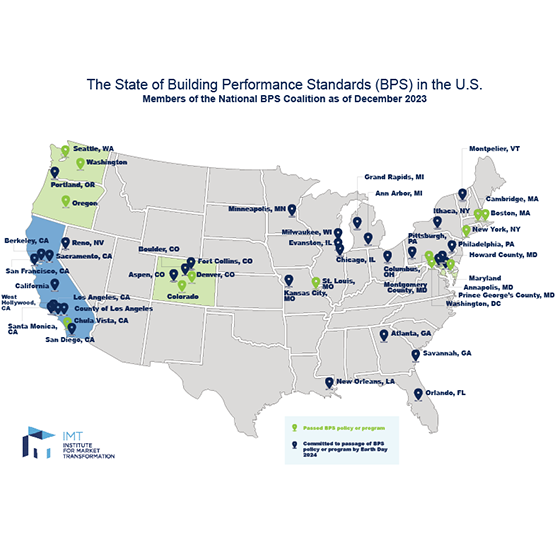Large Existing Building Decarbonization
Energy used in buildings is the leading contributor to MN greenhouse gas emissions. Although focus on decarbonizing energy generation is important, reducing energy demand is just as critical and often less costly. In 2023, Minnesota lawmakers required building benchmarking, a practice for measuring and monitoring building energy use, for commercial and multifamily buildings 50,000 square feet and greater in the Twin Cities metro and Duluth, Rochester, and St. Cloud. Building benchmarking helps drive energy efficiency improvements in buildings and typically results in 1–3% energy savings annually.
The pace of energy and greenhouse gas emission savings, even with the benchmarking policy, is insufficient to meet Minnesota’s climate target of net-zero greenhouse gas emission by 2050. Members of the MN legislature are motivated to work on climate-focused legislation and address this gap. According to Minnesota’s Climate Action Framework, retrofitting large existing buildings and improving building energy efficiency standards were identified as two of the highest impact strategies for reducing cumulative greenhouse gas emissions.
It is for these reasons that Center for Energy and Environment (CEE) hosted a workshop series bringing together stakeholders of large existing buildings to discuss policies to reduce emissions in such buildings. In particular, a large portion of the conversation will be on building performance standards (BPS) policy, as it is an increasingly common approach nationally to address this issue.
What are building performance standards?

BPS establishes carbon and energy performance targets for large existing buildings. This policy drives continuous, long-term improvement in buildings over time. As buildings stand for 25, 50, 100+ years, BPS can play a role in meeting Minnesota’s climate goals.
Currently, 14 cities and states have adopted BPS. In 2022, President Biden launched the National BPS Coalition to support such policies. The Coalition includes 40+ participants of state and local governments that have committed to inclusively design and implement building performance policies and programs in their jurisdictions.
Engagement Resources
Decarbonizing large existing buildings is a complex topic and involves many stakeholders. It is important that they can learn, share, and discuss their hopes and concerns prior to any potential large existing building decarbonization policy. Since 2023, CEE has facilitated a number of workshops and meetings with building stakeholders including utilities, professional organizations, labor organizations, contractors, and state agencies. Below are resources from those conversations.
2023 BPS Workshop Series Summary Recommendation
2024 BPS Bill Overview 7/23/24 Slidedeck
2024 BPS Engagement Meeting 9/19/2024 Slidedeck
2024 BPS Engagement Meeting 10/16/2024 Slidedeck
2024 BPS Engagement Meeting 1031/24 Slidedeck
External Resources

